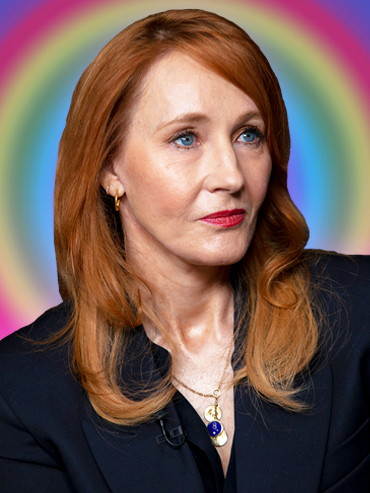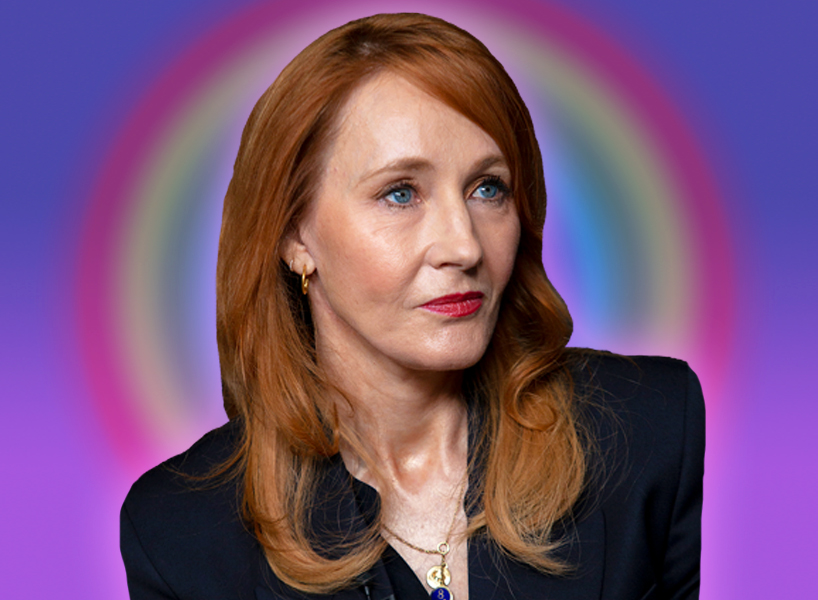Dear J.K. Rowling, It’s Not Representation If You Don’t Actually *Write* Gay Characters
Just sayin'


Before all you Harry Potter fans @ me, I solemnly swear that I am up to only good. (That was a really clever HP reference, for the rest of you.)
As a child, I instantly fell in love with J.K. Rowling’s characters and the story’s adventurous plot. I even made myself and my ten-year-old friends/co-witches our very own makeshift wands, so we could arrive to the theatres ready for action (*cringe*). The series provided the perfect escape from my own reality, which is why I didn’t expect it to reflect any other form of reality—including queerness. This isn’t to say that fantasy fiction can’t involve queer characters. I just didn’t expect HP to do so, because it was written in a different era. In fact, my understanding was that the world of Harry Potter existed completely outside of queer content and culture.
But that doesn’t seem to align with how J.K. Rowling sees the Wizarding World, specifically the wise and famous Professor Dumbledore, Hogwarts’ headmaster and Harry’s mentor. Recently, on the extended cut of the new Fantastic Beasts: The Crimes of Grindewald, she spoke about the “relationship” between Dumbledore and the titular antagonist of the film, Grindewald. “Their relationship was incredibly passionate, incredibly intense, and it was a love relationship,” she explained. “I’m less interested in the sexual side, though I believe there is a sexual dimension to this relationship, than I am in the emotional relationship.”
This isn’t the first time Rowling has addressed Dumbledore’s sexuality. In 2007, Rowling admitted in a Q&A session that she had “always thought of Dumbledore as gay” Fans were shocked at this new revelation, considering it had never been addressed, or even nodded at, in the series’ lifetime which, if we’re counting, spans ten years, seven books and eight movies.
But back then, that shock was mostly pleased. In fact, Rowling has actually been praised in the past for expanding people’s understanding of queer people. After all, the idea of writing a gay character whose storyline does not revolve around their sexuality is great—in theory. Straight characters get to have intricate storylines and defining character traits that have nothing to do with who they love, so why should that be the gay characters’ most prevalent quality?
But Rowling’s comments, then and now, are actually pretty problematic. When a character’s sexuality is not mentioned or displayed at all, it is incorrect and irresponsible to call that “representation.” Dumbledore’s off-the-record gay identity did nothing to make me feel less alone when I was in high school and discovering my own sexuality. True, I probably wouldn’t have seen myself in an elderly, white, British wizard. But reading about a canonically gay authority figure may have at least sparked conversations that would have made it easier to think about my sexuality. To be clear, I’m not saying she should’ve written a steamy makeout sesh between Dumbledore and Grindewald. But something that implied intimacy, other than “flirting with ideologies,” would have been appreciated and well-received.
Unsurprisingly, Rowling has grasped at other types of diversity before, and in very similar ways. When Harry Potter and The Cursed Child, a spinoff play, made its debut in 2016 with Black actress Noma Dumezweni playing Hermione Granger—a character who is most notably played by *white* actress Emma Watson in the movies—there was a distressing level of backlash on social media. When asked about it, Rowling responded smugly that “white skin was never specified.”
Canon: brown eyes, frizzy hair and very clever. White skin was never specified. Rowling loves black Hermione 😘 https://t.co/5fKX4InjTH
— J.K. Rowling (@jk_rowling) December 21, 2015
Similarly, when asked about religion, Rowling claims that although most of the students are Wiccan, Anthony Goldstein, an extremely obscure student at Hogwarts mentioned only a handful of times, was actually Jewish. Wow!! A character that I literally had to Google to remember is Jewish? Sure, J.K. That one statement *totally* counts as fair representation of faith and culture. (*Insert heavy dose of sarcasm here please and thank you*).
If J.K. Rowling wants to promote diversity with her characters, she should write it into the actual text, or at the very least push to include an easter egg in the movies. Instead of sending tweets designed to re-write her previous texts, she should use them to talk about how she’s going to do better in the future. But I refuse to let someone who doesn’t even belong to these communities exploit and profit from diversity as if it were a trend.
Yes, it is 2019, and yes, we should be striving for inclusivity. But let’s not just hop on the inclusivity train because it’s newly acceptable and it can potentially get us praise. Let’s be inclusive *because it freaking matters* to the people in those communities.
J.K. Rowling Confirms Some Characters in Her Books and Movies Are Gay Everywhere Except in the Books or the Movies https://t.co/Y5gcbMWNB9
— Eric D. Snider (@EricDSnider) March 16, 2019
‘re Pumped
Sophomore: We Need More Coming-Of-Age Films About Young Black Women
I’m Sick Of Retailers Capitalizing on Chinese New Year








